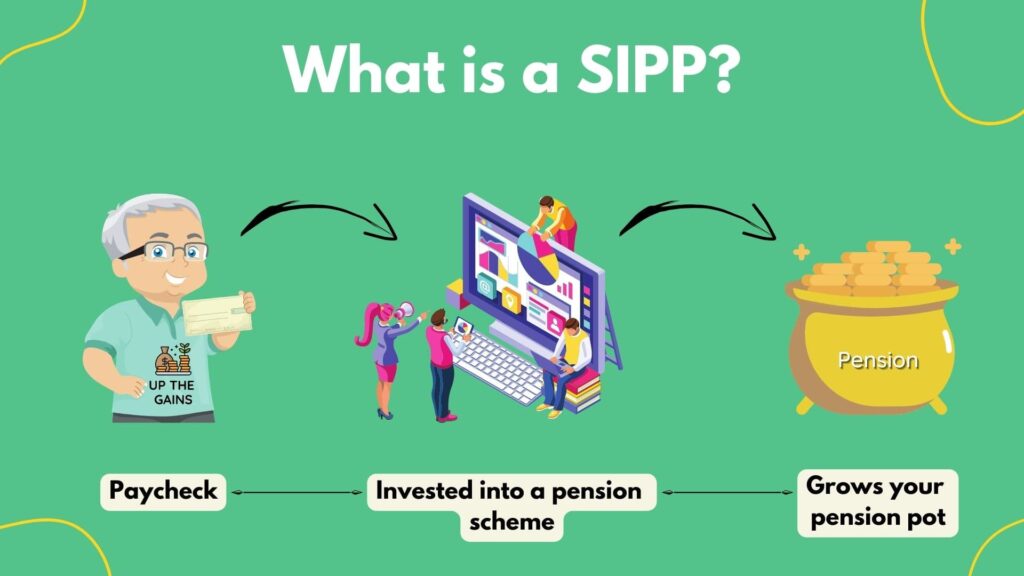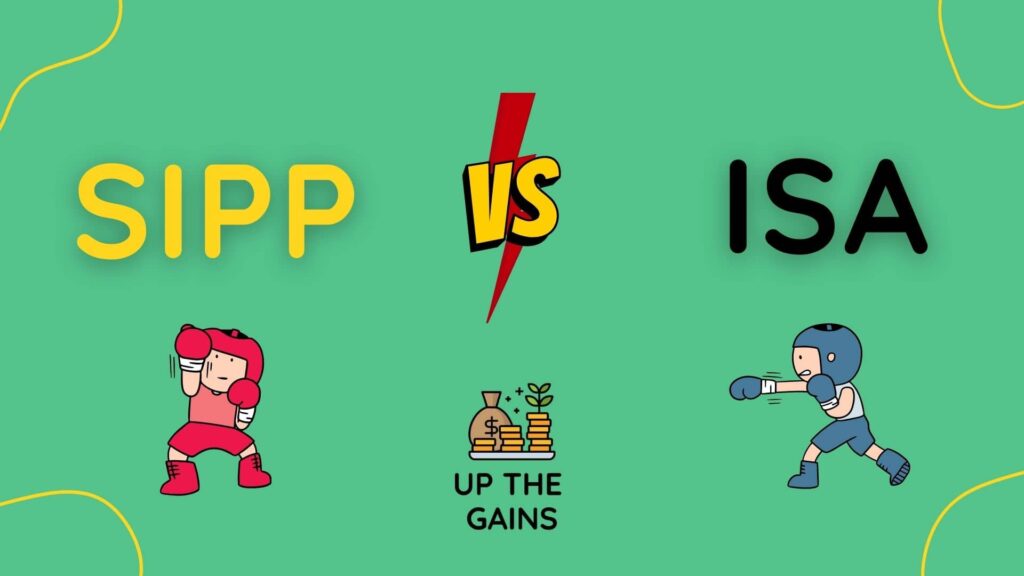
Sammie Ellard-King
I’m Sammie, a money expert and business owner passionate about helping you take control of your wallet. My mission with Up the Gains is to create a safe space to help improve your finances, cut your costs and make you feel good while doing it.

Quickfire Roundup:
There is no winner here. Both account types are outstanding and offer excellent tax incentives.
It depends on how quickly you need the money and your personal financial goals. Use an ISA for your short to medium goals and SIPPs for retirement pots.
Saving and investing money is challenging, but getting added assistance in the form of tax benefits is a real plus. That’s what SIPPs and ISAs give you.
Whether you choose an ISA or self invested personal pensions (SIPP), you get access to rates and flexible investment products that standard accounts can’t offer you.
But we’re here to decide which is the best account to invest your money in, so let’s get started with SIPP vs ISA – the ultimate saving and investing battle!
Table of Contents
SIPP vs ISA
Firstly it’s important to know that both of these accounts offer zero capital gains tax on any realised profits or interest you may receive.
Not only is this useful for short term savings goals with ISA accounts, but as you move closer to retirement, the last thing you want to be doing is paying back taxes.
The main difference between the two is that you can’t access your money with SIPPs locked until your retirement date, whereas ISAs are much more flexible.
Let’s look into each type of account in more detail so you can make the right decision for your money.
What is a SIPP?
A SIPP or self-invested personal pension (also known as a stakeholder pension) allows you to choose exactly where your money is invested.
Essentially you have complete autonomy over the types of investments you hold, allowing you access to a range of shares, funds and trusts.

Personal or private pensions, as they can also be known, are different from your workplace pensions which your company will provide for you.
Company pensions in the UK are usually with a provider like Nest or People’s Pension, and whilst these companies are market leaders, you have little say over where your money is going.
I have a company pension, which I pay myself through Up the Gains, and I invest some of my ‘wages’ into a SIPP.
The key is to maximise your money as the state pension of £185.15 a week is nowhere near enough for most of us to live on once we get to retirement. Having that extra cushion of a pension will take the stress away.
The key benefits of a SIPP:
- Freedom to choose where your money is going
- Expert-managed options where trusted managers will invest your money for you.
- Not subject to pay income tax and capital gains tax from growth and interest
- Exempt from inheritance tax
- You can have multiple SIPPs
- You can pay £40,000 each year or 100% of your salary into your SIPP – whatever number is lower
- Get a government bonus (20%) on everything you put in
- If you’re a higher rate taxpayer, you can get 40% back, and this increases to 45% for additional rate taxpayers
SIPP Rules
SIPPs have a specific set amount of rules that benefit the individual that pays in. Let’s take a look, as this is where it gets interesting.
SIPP tax relief
- Pension annual allowance is up to £40,000 or 100% of your salary. This resets each tax year which runs from April to April
- This amount is eligible for the 20% government bonus as a basic rate taxpayer, so for example, if you pay £80, you would have £100 in your personal pension
- You do not need to do anything to get your tax relief, as your pension provider will handle this for you
- If you’re a higher-rate taxpayer, you can claim an additional 20 or 25%, but this would need to be claimed via a self-assessment
- Your extra tax relief as a higher-rate taxpayer is paid back to you by HMRC to a nominated personal bank account
- You can claim back up to four years of higher rate pension tax relief by completing a self-assessment
SIPP Lifetime Allowance
- You have a maximum of £1,073,100 lifetime limit that you can withdraw before you pay tax
- If the value of your investments goes over this, you will be taxed for the withdrawal
Drawdown / Withdrawing
Now all these tax benefits sound great, but it’s important to note that you cannot withdraw your pension before the age of 55. This number is set to increase to 57 in April 2028.

You have a few options to consider when taking money out of your pension:
- Lump Sum – you can take up to 25% of your entire pension in a lump sum tax-free
- Regular drawdown payments – You can arrange regular payments, which are classed as income, so you will need to stay below the income tax-free threshold of £12,750, or you’ll be subject to income tax payments
- Multiple Lump Sums – You can take multiple lump sum payments with the first 25% of each payment tax-free and the remaining 75% subject to income tax at the marginal rate
If you need help with what to do when drawing down your pension savings, then speak to your provider or a financial adviser for some professional advice.
Workplace pension or personal pensions?
Workplace pensions do have their benefits due to the legal minimum matched contribution by an employer being a minimum of 3%.
Your employer decides the kind of workplace pension you pay into, but you should look to maximise this as it’s essentially free money. If, for example, your employer contributions go up to 5,6 or even 10%, then pay more into your workplace pension.
Free money is free money.
Then you could have a smaller personal pension which you control to back it up. It depends on how much control you have, what you’re being paid and whether your employer has a good pension scheme.
Add this all up, and you could be one step ahead of most others!
What is an ISA?
ISAs or individual saving accounts are government set-up products for you to save and invest your money. They’re fantastic and should be a part of everyone’s financial product portfolio in some capacity.
There are four main types of ISA which are:
- Cash ISAs – used primarily for savings
- Stocks and Shares ISAs – used primarily used for investing
- Lifetime ISAs – used primarily for first-time buyers and retirement savings
- Junior ISAs – used primarily for young children to save and invest
This article will only discuss Stocks and Shares ISAs and Lifetime ISAs because these are the only ISAs you can invest your money from.
If you’re wondering more about ISAs vs savings accounts, then we cover that in another article.
Stocks and Shares ISA
Pros
- Tax-free contributions of up to £20,000 ISA annual allowance – this resets each tax year which like a SIPP runs from April to April
- Access to global markets to invest in shares, funds and trusts
- Self-managed and expert-managed options to help different levels of investors
- Returns can vastly outweigh Cash ISA and standard savings accounts
Cons
- You may get back less than what you put in (this is the same as your pension pot)
- There are 1000s of options, and it can be overwhelming for beginners, so do your research
- There are fees for using them, albeit not that high

Lifetime ISA
Pros
- You can contribute £4000 per year as part of your overall £20,000 annual ISA allowance
- The government matches your contribution up to £1000 or 25% of anything you put in
- You can invest the money that’s in your Lifetime ISA to improve the overall amount
- You can earn up to £32,000 in government bonus over the account’s lifetime
Cons
- You can only use the money for your first home or for your retirement
- They are only available for people aged 18-39 to open

There are many plus points to owning either a Stocks and Shares ISA or a Lifetime ISA. Next, we’re looking at the overall benefits and drawbacks of having an ISA vs SIPP.
Overall ISA Pros
- You can withdraw money from an ISA whenever you like
- Tax free savings
- You have control of where your investments go
- You don’t need to wait until you’re retired to enjoy the money
Overall ISA cons
- Max contributions of £20,000 a year vs £40,000 for a SIPP
- You’re putting in taxed earnings rather than untaxed ones if you pay into a SIPP
- No bonus on your contributions (other than a Lifetime ISA but only a max of £1000)
- You can not carry forward and unused allowance
Can I have an ISA and a SIPP?
Yes, you can. In fact, it’s often advised to hold both types of accounts as both offer tax-efficient ways of saving for your short term goals and for retirement.
If you’re just getting started and are unsure what to open, it’s advisable to seek professional help from a financial advisor.
SIPP Vs ISA - Who wins?
So, I think we’ve established that both accounts have great tax benefits but do completely different things.
It will totally depend on many factors here so no account type can win this. That being said, at least one of these products should be on your radar if you’re only investing in GIAs (general investment accounts) or basic rate savings accounts; your money is subject to income tax.
Growing your money over time with the added benefits of tax reductions will vastly outweigh any other type of investing.
FAQs
Do I need to declare a SIPP on my tax return?
Yes, you will need to declare your SIPP on your self-assessment tax return if you are a higher or additional rate taxpayer. This way, you can get your tax paid back to you. If you’ve yet to claim the additional rate, you can claim back the tax for the previous three tax years.
Is a SIPP better than a workplace pension?
No, in fact if used together, you can receive tax relief on both accounts, plus have your employer pension contributions added on top.
Both offer useful tax advantages, but a SIPP gives you more control over where your money is invested. Equally, both invest via the stock market through an investment account.
If you are self-employed, however, a SIPP is your only option for a pension pot.
Check out the best self employed pensions.
What happens to my SIPP if I die?
Any money paid into your SIPP will usually be passed onto a spouse when you die.
SIPP or ISA - Roundup
Nobody likes paying tax or sticking to the tax rules, so if you’re looking to pay money in a tax-efficient way into an investment account, then you should consider both an individual savings account and a SIPP as part of your financial plan.
Both have their benefits, and if you’re planning on saving money either short-term or long term then they are fantastic options.
You can see from the pension rules in place that you can only withdraw money once you reach retirement age, so plan accordingly to access your money when you need it.
Share this article with friends
Disclaimer: Content on this page is for informational purposes and does not constitute financial advice. Always do your own research before making a financially related decision.



